
In An Eyeball-To-Eyeball Conflict, The RBI Is Bound To Lose Ultimately
The RBI is right to demand autonomy and retain its independence, but it is making a serious mistake in believing that the government’s hands are tied.
One key bone of contention between the Modi government and the Reserve Bank of India (RBI) is the latter’s decision to shift as many as 11 public sector banks under prompt corrective action (PCA), which makes it impossible for them to restart lending till they fix their bad loans problem.
There is no point blaming the RBI for putting these restrictions when the answers clearly lie with the government. Either it can recapitalise them substantially, or it can formally guarantee their solvency, thus making it possible for them to restart lending even without formally having the capital to do so. Lending more without additional capital backing is risky only if there is no one to backstop the risks. But when the mai-baap is behind you, PCA can be ended through executive action alone. The only constraint these banks will face is in operating abroad. But most Indian banks do not operate more than a couple of branches abroad. These can be wound down easily.
The RBI is foolish to take on the government needlessly over independence as the government always holds the high cards. It can embarrass the government by saying or doing things that show the latter in bad light, but ultimately it cannot go against what an elected government wants to do.
Let’s say the RBI refuses to lower rates or wants to raise interest rates. Well, the budget can offer interest subvention schemes to specific sectors, whether it is for buying affordable homes or boosting exports or any other policy-backed initiative.
If the RBI won’t offer a special window for selling forex to oil companies, the government can always allow them to borrow in dollars to take the pressure of the forex market and defend the rupee.
And now that the RBI has raised the ante by publicly targeting the government on independence, the latter can easily overrule the central bank and create a separate payments regulator. Even more, it can take away banking supervision from the central bank and create a separate supervisory agency. Third, it can shift public debt management outside the RBI to the Finance Ministry.
The RBI is right to demand autonomy and retain its independence, but it is making a serious mistake in believing that the government’s hands are tied. They are not.